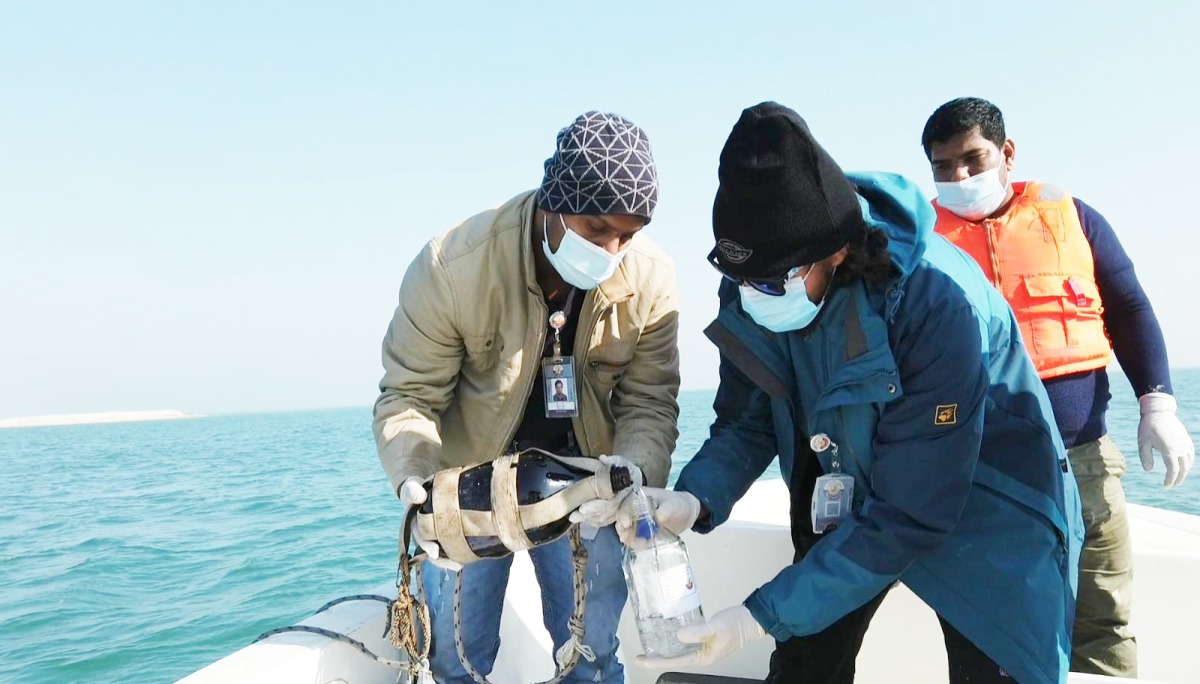
The Water Quality Section at Environmental Monitoring and Laboratory Department of the Ministry of Environment and Climate Change is implementing a number of projects to preserve marine environment and maintain water quality in Qatar.
The projects aim to achieve sustainability and environmental protection goals of Qatar National Vision 2030.
The projects are focusing on marine environmental programmes and real-time monitoring network, contributing to database establishment and analyzing time-series of the major data indicators such as temperature, salinity, dissolved oxygen, and chlorophyll along with their positive and negative trends.
The Ministry is developing and preparing strategies to be implemented at the national level in cooperation with other sectors of the Ministry in supporting environmental projects such as the conservation of shark, whales, dugongs, endangered hawksbill sea turtle.
In an interview with The Peninsula, Yousuf Mohammed Alawadhi a Biological Researcher at Water Quality Section of Environmental Monitoring and Laboratory Department, at the Ministry that the pressures affecting the marine environment are a continuing threat to ecological processes and marine biodiversity due to the geographical nature of Qatar such as limited landmass.
“In fact, due to geographical conditions characterized by extremes of temperature and salinity, the changing climate (in future) will produce more detrimental consequences for the marine environment in Qatar,” said Alawadhi.
He said that biodiversity of marine life might be under stress which may lead to adverse consequences of the sustainability of fisheries and blooming of harmful algae and jellyfish can pose a threat.
“Data obtained from environmental programs are being utilized to establish a database on marine environment properties to provide policy recommendations and necessary information for decision-makers about marine environmental protection and management. As well as statistical analysis and environmental indicators that reflect the state of the environment,” said Alawadhi.
To a question about the mechanism for disposal of industrial waste, Alawadhi said: “Regulatory measures are being implemented by the department to control industrial wastes generation with the support of in-field environmental operation and assessment.”
Speaking about programmes to monitor marine environment, he said that apart from the regular monthly, semi-annual, annual in-field marine and coastal monitoring programmes, there are in-progress projects by the department including ‘Project for the establishment of real-time environmental monitoring network and early warning system for the water quality of the marine environment’ and ‘Research and cognitive studies project for the quality of the marine environment’.
“Other programmes are regional cruises undertook in Exclusive Economic Zone (EEZ) offshore waters on Janan Research Vessel in cooperation with Qatar University, every year study in Khor Al Adaid, and responding to cases related to water quality in Qatar,” said Alawadhi.
Highlighting the role of Environmental Laboratory, he said that the laboratory is working on environmental marine samples and biodiversity analysis which supports greatly in preparing marine environment monitoring reports.
Alawadhi said that the Environment Monitoring and Laboratory Department and Qatar University have reaffirmed their commitment to strengthen mutual cooperation on the development of regional water quality improvement in the State of Qatar beside other suggestions and programmes taken to achieve the ultimate goal of marine sustainability and environmental monitoring.
To achieve environmental preservation and sustainability, he said, the Ministry has enhanced cooperation with other research institutions in Qatar, such as QU, research centers, and other stakeholders (government and private sectors), such as oil companies that initiate study projects in respect of the conservation and management of shark, whales, and dugongs, and other projects.
“Endangered Hawksbill Sea Turtle Protection Project in cooperation with Qatar University is being implemented to address the issue of jellyfish blooming,” said Alawadhi.
He said that a number of projects are also being implemented related to marine biodiversity protection in line with the National Strategy for Biodiversity in Qatar.
“The Ministry has initiated Biodiversity Database Project with the involvement of UNEP and the concerned government bodies including QU, which will contribute to fauna identification and their locations and endangered species that will demonstrate the importance for protection and environmental sustainability programmes,” said Alawadhi.
He added that the community members are engaged across environmental awareness-raising programmes bearing in mind that biodiversity is a part of Qatari National Heritage and environmental legacy for future generations.
“Therefore we have contributed to biodiversity conservation by which, we believe, sustainable development goal is being achieved,” said Alawadhi.
Responding to another question about the efforts of the Ministry of Environment and Climate Change to create awareness about the importance of preserving environment, Alawadhi said: “The Ministry is implementing the National Strategy of Biodiversity 2015 - 2025, to achieve the Qatar National Environment and Climate Change Strategy 2030; of which biodiversity is one of the important objectives.”

Speaking about the cooperation with GCC and international community to protect the environment, Alawadhi said: “Qatar represented by the Ministry of Environment and Climate Change has signed several international agreements and conventions which maintain the sustainability and biodiversity, as a form of international cooperation such as UN Convention on Biodiversity, CITES Treaty, which protects the endangered species of fauna and flora from being sold, and the derived protocols, in addition to the GCC, and Convention on Biological Diversity (CBD).”
He said that other cooperation and participation include regional-based meeting on the 2022-2025 Medium-term Strategy and Programme of Action 2022-2023, organized by UNEP Regional office for west Asia - ESCWA.
“Another one is strategic cooperation on environmental conservation, contribution to the attainment of the strategic development goals, and training and education courses development organized by UNEP - UN Environment Programme,” said Alawadhi.
He said that the scope of reclamation and its impact on the coastal and marine environment, organized by Gulf Cooperation Council (GCC) and training course on the manifestations of land sensitivity to wind and soil erosion, organized by Regional Center for Remote Sensing of North Africa States (CRTEAN) in cooperation with Intitut des Régions Arides - Arid Regions Institute are among the efforts.




